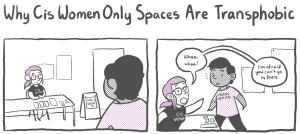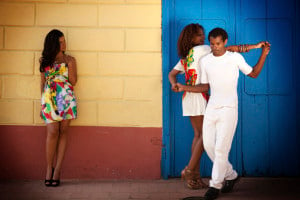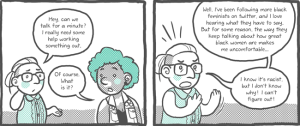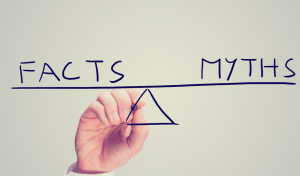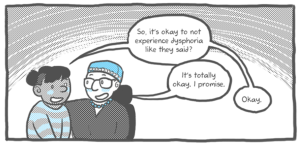In my first year of college, I stopped calling myself an activist.
It took attending just a few meetings of the campus queer group for me to realize that I didn’t fit in with everyone else. Despite that the fact that I was definitely queer – a pre-transition trans woman at the time – I could tell immediately that I wasn’t “queer enough” to fight for social justice alongside these university-educated revolutionaries who spoke with such confidence and rolled their eyes every time I opened my mouth.
I didn’t know what “trigger warnings” or “intersectional systemic oppression” were. I didn’t dress in ripped denim and black leather, or have a colorfully dyed, asymmetrical haircut. I wasn’t white, like most of the people in the room. I didn’t even know who this “Judith Butler” person that everyone seemed to love so much was.
Simply being racialized, a trans person, and survivor of abuse had apparently not prepared me to talk or think about racism, transphobia, or trauma in any valuable way. Neither had facilitating workshops on homophobia in my hometown.
And after a few weeks of feeling confused and invisible, I decided that I just wasn’t smart enough to be an activist.
Six years, two degrees, one gender transition, and a bunch of published Internet rants later, I’m able to see that my feelings about those early forays into social justice weren’t so much about my personal capacity or value as they were about exclusion and accessibility.
Social justice and feminist culture are incredible positive forces that can transform the way we see ourselves and the world around us. Without social justice and the activist communities that form around it, I literally wouldn’t be alive today.
But sometimes those same activist cultures can be unnecessarily exclusive – and worse, inaccessible and elitist. I even feel myself doing it sometimes:
I roll my eyes when someone at a community meeting asks a “stupid question” about feminism. I snap unnecessarily when someone doesn’t know the latest politically correct terminology. I make assumptions about people who I perceive (usually wrongly) as either too young to know anything or too old to be down.
Social justice is such a beautiful, powerful part of my life that I want – need – it to be open to those I care about, from my fifteen-year-old sister to my corporate lawyer friends to my racist grandparents.
So here, for your reading pleasure, are nine ways I’m trying to make my activism more accessible to everyone.
1. Welcome People Who Are Trying to Learn
Activist communities can be very loving, but they can also be cliquey and hostile to newcomers who don’t speak the right language or even wear the right clothes.
At our worst, social justice culture is basically a rehash of high school, except that everyone is trying to one-up each other with how cool their politics are.
If we really want to create open, caring communities, then we have to create spaces (both online and IRL) where the learning process is welcome and valued.We have to celebrate the new possibilities that each new individual brings.
In practical terms, this means making sure that community meetings are open to newcomers, and that quieter and introverted folks are given opportunities to speak. It means that terminology is explained when necessary, and it means not using academic jargon to sound impressive.
Most of all, it means giving up the unrealistic – and frankly, oppressive– expectation that everyone should step into social justice conversations from an equal starting point – that everyone should or has to know exactly how to do everything perfectly, right away.
It means having the humility to know that all of us are, in fact, still amateurs at the work of making social justice ideas into reality.
2. Prioritize Physical and Economic Accessibility
If we, as activists and feminists, want to be accessible, then we need to—you know—actually be accessible!
As in, we need to make sure that disabled (I am using disability-first and not person-first language here for these reasons) folks can actually enter and comfortably get around in the spaces we use for work, meetings, conferences, workshops, parties, and every other event.
We also need to ensure that folks with children, people on welfare and fixed incomes, and basically anyone who might not have access to a lot of money and time can participate in community building.
Organizing childcare stations (this can be super fun), making events free or pay-what-you-can (it can be done!), and finding ways to compensate folks for “volunteer” work (which usually only middle class and wealthy folks can afford to do) are just a few examples of how this can be done.
These are some very basic practices that many community organizers tend to overlook, because society tends to turn accessibility barriers invisible to those not affected by them.
Addressing even a few of these very simple things, however, completely changes who can participate inand benefit from activism.
3. Celebrate Age Diversity
What young intersectional feminist doesn’t have a horror story about being trapped in a conversation with an older person who “just doesn’t get it?”
And what older, veteran activist doesn’t have a cringe-worthy anecdote about know-it-all youngsters who think that everything worth knowing can be found on a screen?
Ageism is a huge, unspoken problem in social justice culture.
Something I’ve noticed is that activist communities tend to be concentrated within an age range of 5-7 years, meaning that there is very little intergenerational overlap between them. This means there is little community memory to guide us. It also means that activism is not necessarily open to people creating and raising families.
An older feminist friend once said bitterly to me that “Activists all start out at 18 or 20, and then age out at 40. There never any children or elders in social justice communities, which means they aren’t really communities. They’re just scenes.”
These days, as I’m writing or organizing, I like to ask myself: Is my feminism one that I could see kids growing up with and participating in? Am I grounding myself in the wisdom of elders and mentors?
4. Make Room for Mistakes and Accountability
Sometimes I get really anxious about writing articles or organizing events about social justice. I’ve been part of one too many vicious Internet flame wars and public debates, and I know how intense and painful being publicly called out for making a mistake is.
I have friends who have sworn off feminism and community organizing for this very reason – because they said or did the wrong thing, and got burned for it.
We need to make room for people to make mistakes in their activism – and to grow from them.
I’m not saying that we should stop calling out oppressive language or behavior, or that we should tone police folks who are talking about the oppression they are directly experiencing. Definitely not – we have a right to speak up and to be angry about oppression.
I’m saying that doing the work of social justice is a skill that takes time, patience, and teaching to learn. I’m saying that we can’t treat people as though they were disposable – try one out and throw them away if they don’t work out.
We need to put our faith and our energy into showing each other how to do things right, rather than punishing each other for getting it wrong.
5. Value Intention and Action More than ‘Correct’ Language
Obsession with “correct” language plays an enormous part in making social justice inaccessible to many people. Feminist terminology changes practically every day, it seems, and making a mistake with it can be cause for intense social backlash.
And no, I’m not one of those folks who is always moaning about how the “PC generation” is ruining the world. I know what it feels like to be constantly misgendered, to hear racist slurs about my people casually tossed out as a joke.
I believe that when people say things that reinforce oppression and cause pain, they should be made aware of it.
However, I’m also starting to realize that being considered a “good feminist” is an endeavor that can require an enormous amount of privilege: It takes time and certain kind of education to read and keep up with social justice ideas. Not everyone’s style of learning or thinking lends itself easily to learning new ways of thinking and talking.
Living in Quebec, where the majority language is French (in which it is virtually impossible to use gender-neutral pronouns) and having to exchange complex ideas when I can barely use certain French tenses has given me a whole new appreciation for valuing folks’ intentions and actions over their language use.
Instead of judging my relationships by whether or not my non-anglophone friends are using the correct terminology, I have to ask myself: Is this person genuinely trying to be respectful? How important is terminology or pronouns versus the way that someone treats me and acts on their values?
Some activists use the phrase “Intention doesn’t matter – effect does” when it comes to using offensive language. I disagree. Intention and effect matter, because how we understand where someone is coming from can change the effect of what they are doing or saying.
6. Learning the Art of Calling In vs. Calling Out
When we do confront folks about talking or behaving oppressively, it can be super important to choose between “calling them in” (gently and lovingly explaining why they need to change what they are doing) and “calling them out” (responding with anger and social pressure).
Both are equally valuable and necessary tactics, but require judiciousness: Calling out is empowering because it allows oppressed individuals to respond and express valid emotions like rage and frustration. Calling in is useful because it allows folks who have done something oppressive to learn without feeling the need for defensiveness (well, that’s how it works on a good day).
My personal guideline is that I only call folks out if I am directly affected by what they are doing or saying – that is, if their words or actions are harming me, and not someone that I’m trying to be an ally to. Calling someone out for doing something that impacts people with identities and experiences other than my own feels disingenuous and needlessly alienating.
7. Acknowledge and Break Down Activist Hierarchies
A dynamic we rarely acknowledge in activist communities is that there is a social hierarchy based on experience and popularity: Folks who are good at talking and writing usually have the most power, while those who have less experience and are less vocal have the least.
Often, we create miniature celebrities out of our favorite activists and social justice writers, vloggers, and artists: These are the people who get tons of “likes” on Facebook and shares on their blog posts.
When unacknowledged, this dynamic make social activism less accessible because they prevent new activists from being heard. Folks who don’t have the time or ability to lead protests or write articles are excluded from taking the lead, even when the issue at hand affects them most.
Worst of all, activist social ladders can create a breeding ground for abuse, exploitation, and sexual harassment and assault. Too many of my acquaintances – particularly young women – have left social justice movements because of bad experiences with activist “celebrities.”
The revolution starts at home: If our movements are going to undo the abuse of power in the world, we have to undo it in our own communities.
8. Value Everyone’s Contributions
The best thing I ever got at a social justice conference was a dishtowel: Embroidered on it are the words “Everyone wants a revolution – no one wants to do the dishes.”
It’s easy to give someone glory and social cred for being an Internet personality or making a speech at a march. It’s easy to get lost in judging other folks’ value by how well they “speak feminist” or how many articles they’ve written.
It’s harder to recognize and celebrate the invisible and unglamorous work like child raising and cooking and cleaning that has always traditionally been done by women, particularly migrants and women of color.
This, however, is the work that makes any “movement” possible, and is equally important as speaking on a panel or teaching at a university.
We need to start recognizing and centering this work, and the people who do it, in order to build truly accountable social justice communities.
9. Center Love
People always seem to forget about love in the movement.
We get caught up in righteous anger, in validating sadness, in the cold hard realities of violence and abuse. We talk about smashing the patriarchy, breaking the gender binary, shattering the glass ceiling.
This is all important, and very empowering, but I guess I’m tired of running on rage and despair alone.
So here’s my access request to my social justice community: I want our activism to be fun. I want it to be fulfilling, and caring. I want it to be full of love.
And love – radical love, transformative love, the kind that brings people in and changes us over a million private revolutionary moments – doesn’t leave people out of the movement.
[do_widget id=’text-101′]
Kai Cheng Thom is a Contributing Writer for Everyday Feminism. She is a Chinese trans woman writer, poet, and performance artist based in Montreal. She also holds a Master’s degree in clinical social work, and is working toward creating accessible, politically conscious mental health care for marginalized youth in her community. You can find out more about her work on her website and at Monster Academy.
Search our 3000+ articles!
Read our articles about:
Our online racial justice training
Used by hundreds of universities, non-profits, and businesses.
Click to learn more













